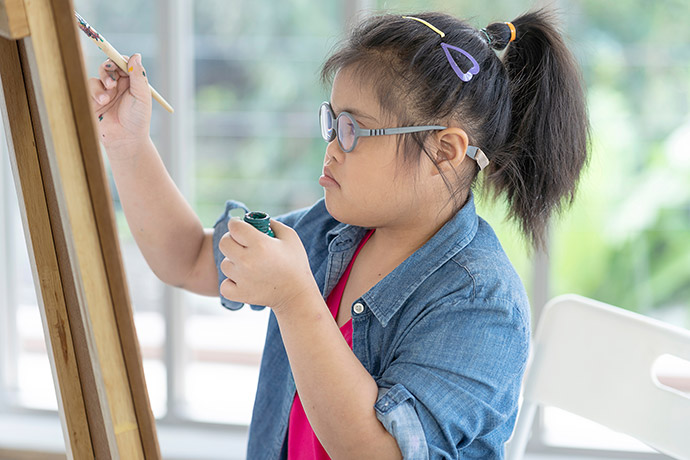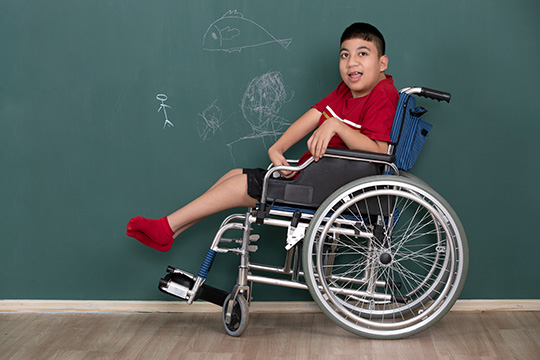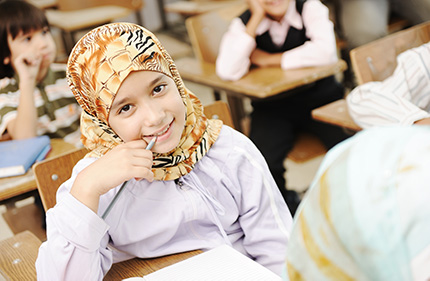Home » People and Settings » Education
Education
Overview of Education
Children attend school until they are young adults. Early childhood and kindergarten classes help children develop academic and social skills that they will need as they get older. Elementary and middle school students learn core academic and social skills. In high school, students prepare for jobs or get ready to attend college or universities. Schools prepare students to become adults who will contribute to their communities. Although the academic and social settings change as children grow and develop, some things stay the same. Teachers and school staff work hard to prepare students for success. Some teachers and school staff use positive supports to encourage academic progress. Other positive supports help children become more confident, reduce anxiety, or address social and emotional issues. In some schools, teams work together with students to put positive supports in place to create a positive place for learning. These practices help make sure that all students can benefit from positive supports.


Stories Across the Lifespan
The following stories describe how positive supports can be used throughout a student’s educational journey to support learning and wellbeing.
- Person-Centered Practices and Education: Renee (MNPSP web page)
- Positive Behavior Support and School-Linked Mental Health: Sun County School District (MNPSP web page)
- Positive Behavioral Support and Education: Check & Connect (MNPSP web page)
- Rebuilding For Learning (MNPSP web page)
- Trauma Informed Approaches and Education: North Shore School, Ms. Munoz, John (MNPSP web page)
- Positive Behavior Support and Mental Health: Maple Farm, Maria (MNPSP web page)
- ABA and Educational Settings: Jefferson Elementary School, Ted (MNPSP web page)

Education Resources
General Person-centered Planning Resources
- Culturally Sensitive Collaboration within Person-Centered Planning (2003) (pdf)
- Making Person-Centered Planning Mainstream: How to Get Started (external web page)
- Information About MAPS (external web page)
- Helen Sanderson Associates Person-Centered Thinking Tools (external web page)
- Person-centered Thinking: Improving the Quality of Person-Centered Planning (pdf)
Transition Planning Resources
- Positive Behavioral Interventions and Supports in Minnesota (PBISMN) (external web page)
- What Every Administrator Should Know About School-wide Positive Behavior Supports (external web page)
- Impact: School-wide Positive Behavior Support: Investing in Student SuccessImpact: School-wide Positive Behavior Support: Investing in Student Success (external web page)
- Article: Tier 2 Interventions Within the Framework of Schoolwide Positive Behavior Support (external web page)
- National Technical Assistance Center on Positive Behavioral Interventions and Supports (external web page)
- Advancing Education Effectiveness: Interconnecting School Mental Health and School-wide Positive Behavior Support (external web page)
Special Education Related Resources
- Impact: Feature Issue on Supporting the Social Well-Being of Children and Youth with Disabilities (external web page)
- Impact: Preparing Students with Intellectual Disabilities for College: Tips for Parents and Teachers (external web page)
- Fostering Success in School and Beyond for Students with Emotional and Behavioral Disorders (external web page)
Families and Positive Behavioral Interventions and Supports
- Family Involvement in Functional Assessment (external web page)
Minnesota Resources
- Positive Behavioral Interventions and Supports in Minnesota (PBISMN) (external web page)
- 2015 Minnesota Statutes- 256.995 School-linked Services for At-risk Children and Youth (external web page)
- Department of Human Services School-Linked Mental Health Services (external web page)
National Resources
- Interconnected Systems Framework (ISF) 201: When School Mental Health is Integrated Within a Multi-Tiered System of Support- What’s Different (pdf)
- School-based mental health: An empirical guide for decision-makers (pdf)
- A Framework for Successful Schools (external web page)
- Advancing Education Effectiveness: Interconnecting School Mental Health and School-wide Positive Behavior Support (external web page)
- Center for School Mental Health (external web page)
- Article: Barriers to Implementation of School-based Mental Health (external web page)
- Article: Integration of Education and Mental Health (pdf)
- Transition Coalition (external web page)
Related Practice: Wraparound Planning
- Assessing the Wraparound Process During Family Planning Meetings (external web page)
- The Wraparound Process User’s Guide for Families (pdf)
- Wraparound is Doing Well: An Evidence-based Statement (pdf)
- Systems of Care: Milwaukee (external web page)
- National Wraparound Initiative (external web page)
- Impact: Feature Issue on Supporting the Social Well-Being of Children and Youth with Disabilities (external web page)
- Impact: Preparing Students with Intellectual Disabilities for College: Tips for Parents and Teachers (external web page)
- Fostering Success in School and Beyond for Students with Emotional and Behavioral Disorders (external web page)
Positive Support Strategies for Education
Below are some articles designed to provide important background information about topics that are relevant across lifespans and settings.
- Applied Behavior Analysis in Practice – ABA is focused on better understanding how different variables impact an individual’s behavior.
- Person-Centered Planning and Promoting Quality of Life – One way to think about person-centered practices from a systems perspective is to use a Three-Tiered Model of Positive Supports.
- PBS and Preventing Problem Behavior Using the Three-Tiered System – Considering larger organizational issues can be a helpful way to create a positive climate and prevent challenging behavior.
- Positive Behavior Support and Individualized Planning – The first step in an individualized positive behavior support process at Tier 3 is to set up a person-centered plan.
- Trauma Informed Approaches and Three-Tiered Systems of Positive Support – Trauma informed care approaches are implemented across education and human service organizations.
- Relationship Between Applied Behavior Analysis and Positive Behavior Support – Understand the history and current relationship between Applied Behavior Analysis and Positive Behavior Support

